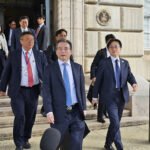Headquarters of WeMakePrice and TMON in Seoul (Courtesy of Yonhap)
South Korea on Monday came up with a plan to offer at least 560 billion won ($445 million) in emergency funds to support small businesses hit by payment delays at Singapore-based Qoo10 Pte.’s two e-commerce platforms – TMON and WeMakePrice.
On the same day, Qoo10 founder and Chief Executive Ku Young-bae apologized for the incident and pledged to use his own assets to help compensate affected customers and vendors.
Following a government task force meeting earlier in the day, First Vice Finance Minister Kim Beom-seok said: “WeMakePrice and TMON must assume responsibility for the payment failure. However, the government is providing emergency financial support to contain this incident and protect consumers.”
He said the government would thoroughly investigate related companies to see if they have violated Korea’s e-commerce laws while vowing to improve regulations to prevent recurrences.
Government officials hold an emergency meeting to provide rescue funds to vendors and consumers affected by the TMON and WeMakePrice incident
The emergency meeting, presided over by Kim, was attended by senior officials from the Financial Services Commission, the Financial Supervisory Service, the Fair Trade Commission, the Ministry of SMEs and Startups and the Ministry of Trade, Industry and Energy.
Under the emergency support plans, the government said it will provide 200 billion won in funds from public institutions for affected small businesses and 300 billion won in credit guarantee funds.
The government also plans to extend 60 billion won to travel agencies on the two e-commerce platforms hit by the payment delays.
Other government measures include extending the maturity of vendors’ bank loans and tax payment deadlines.
TMON’s headquarters in Seoul
SLIPPING INTO CRISIS
In early July, Seoul-based TMON and WeMakePrice began failing to make payments to merchants using their platforms, with the two online platform operators’ parent company Qoo10 saying the problem was triggered by a glitch in its payment system for WeMakePrice.
Sources, however, said Qoo10 could be suffering from a financial squeeze due to its aggressive merger and acquisition deals.
WeMakePrice has unpaid bills worth tens of millions of dollars to hundreds of vendors. TMON is in a similar situation.
SoftBank-backed Yanolja, an accommodation and travel platform, and other travel and ticket booking service providers on the TMON and WeMakePrice platforms informed consumers that accommodation packages and tickets bought through the sites would not be honored.
While some vendors cut ties with platform operators, angry consumers rushed to TMON’s and WeMakePrice’s offices to demand refunds.
The government said it will take steps for people who bought tickets and travel packages through the websites to receive refunds or use the tickets and services as intended.
Qoo10 founder and CEO Ku Young-bae
Missed payments by the e-commerce platforms to vendors have grown to around 210 billion won and are expected to grow bigger, the government estimates.
QOO10 CEO APOLOGIZES
Qoo10 founder and CEO Ku apologized for the incident and vowed to take swift action to secure liquidity by drawing on overseas funds or by disposing of assets and stakes, including his own.
“My deepest apologies to the customers and partners who suffered due to the recent payment delays,” he said in a statement. “I will sell or use my stake in Qoo10, which is most of my assets, as collateral to raise money and solve this matter.”
The CEO said Qoo10 estimates damages to customers, mostly those who purchased travel packages, at around 50 billion won but it’s difficult to give a damage estimate for vendors.
He said Qoo10 is seeking an M&A and funding to raise money for vendors and customers. He didn’t elaborate.
(Graphics by Dongbeom Yun)
Following the TMON, WeMakePrice incident, vendors and consumers are leaving platforms for fear of similar cases
According to app analysis firm Mobile Index, the number of daily active users at 11street and Gmarket platforms decreased by 11.6% and 11.3%, respectively, from the start of July.
AGGRESSIVE DEALS
Singapore-headquartered Qoo10, which has operations in Japan, China, Hong Kong, Malaysia and Indonesia, was founded in 2010 by South Korean national Ku. He also founded the Korean e-commerce platform Gmarket, which was sold to eBay in 2009.
Qoo10 has been aggressively expanding its global business through takeovers.
In February, it acquired US online shopping platform Wish, which has businesses in some 200 countries, for $173 million from Nasdaq-listed Context Logic Inc. to foray into North America and Europe.
Qoo100 acquired TMON in September 2022 from KKR & Co. and Anchor Equity Partners while taking over Interpark Commerce Corp. in March 2023 and WeMakePrice in the following month.
Qoo10 also acquired Korean department store chain AK Plaza’s online shopping affiliate AK Mall for 510 million won in May this year.
By Jae-Kwang Ahn, Sun A Lee and Sang-Yong Park
ahnjk@hankyung.com
In-Soo Nam edited this article.















